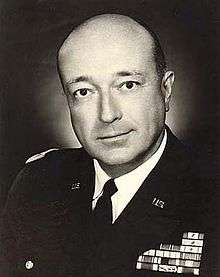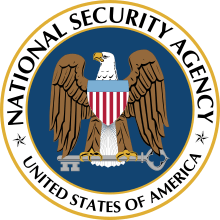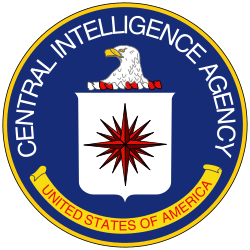Marshall Carter
Marshall Sylvester Carter (September 16, 1909 – February 18, 1993) was a lieutenant general in the United States Army. From 1965 to 1969, he served as Director of the National Security Agency.
Marshall Carter | |
|---|---|
 | |
| Born | September 16, 1909 Fort Monroe, Virginia |
| Died | February 18, 1993 (aged 83) Colorado Springs, Colorado |
| Buried | |
| Allegiance | United States |
| Service/ | United States Army |
| Years of service | 1931–1969 |
| Rank | Lieutenant General |
| Commands held | National Security Agency |
| Battles/wars | World War II |
| Awards | Army Distinguished Service Medal (3) Legion of Merit (2) Bronze Star Medal |
| Relations | Brigadier General Clifton C. Carter (father) |
Life and career
Carter was born on September 16, 1909 at Fort Monroe, Virginia, the son of future Brigadier general Clifton C. Carter. He graduated from the United States Military Academy in 1931 and took an M.S. degree from the Massachusetts Institute of Technology in 1936.
Carter served as an aide to General George C. Marshall during Marshall's time as Chief of Staff of the United States Army, Secretary of State, and Secretary of Defense.[1]
Carter, then a lieutenant general, served as Deputy Director of Central Intelligence from April 3, 1962, to April 28, 1965. From 1965 to 1969, he served as Director of the National Security Agency. Upon retirement from the military, he served as President of the George C. Marshall Research Foundation until retiring from that position in 1985.
Carter was inducted into the Military Intelligence Hall of Fame. He was portrayed by Ed Lauter in the film Thirteen Days (2000), based on events occurring during the Cuban Missile Crisis.[2] Carter is buried in Arlington National Cemetery with his wife, Preot Nichols Carter (1912–1997).
Carter died of liver cancer on Feb 18, 1993 in his home in Colorado Springs[3]
Decorations
| 1st Row | Army Distinguished Service Medal with two Oak Leaf Clusters | |||||||||||||||
|---|---|---|---|---|---|---|---|---|---|---|---|---|---|---|---|---|
| 2nd Row | Legion of Merit with Oak Leaf Cluster | Bronze Star Medal | American Defense Service Medal with Foreign Service Clasp | American Campaign Medal | ||||||||||||
| 3rd Row | Asiatic-Pacific Campaign Medal | European-African-Middle Eastern Campaign Medal | World War II Victory Medal | Army of Occupation Medal | ||||||||||||
| 4th Row | National Defense Service Medal with Oak Leaf Cluster | Chinese Special Breast Order of Yun Hui | Commander of the Order of Orange-Nassau (Netherlands) | Chinese Special Breast Order of Yun Hui (Second Award) | ||||||||||||
References
- Arlingtoncemetery.net entry
- Thirteen Days (2000) – Full cast and crew
- Barnes, Bart (1993-02-20). "GEN. MARSHALL S. CARTER DIES AT 83". Washington Post. ISSN 0190-8286. Retrieved 2020-07-21.
| Government offices | ||
|---|---|---|
| Preceded by Charles Pearre Cabell |
Deputy Director of Central Intelligence 1962–1965 |
Succeeded by Richard M. Helms |
| Preceded by Gordon A. Blake |
Director of the National Security Agency 1965–1969 |
Succeeded by Noel A. M. Gayler |

